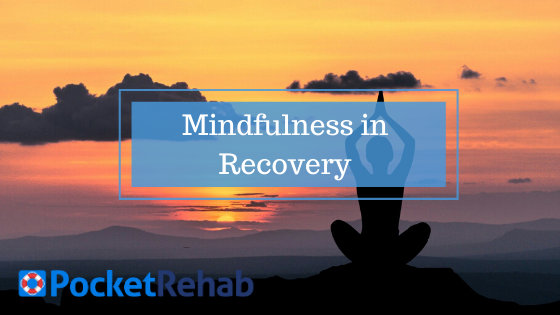Tips & Activities to Practice Mindfulness in Recovery

Addiction recovery is an evolving season in your life when being mindful of the things you do, who you spend your time with, and the attitudes that you have towards seemingly everyday situations matter more than ever. That’s why Mindfulness in Recovery is a skillset that should be closely monitored and accepted as you grow in your recovery and heal. But what exactly is Mindfulness in Recovery? And what steps can you take to be mindful in recovery each day? What is Mindfulness in Recovery? Mindfulness is the term used to encompass the premise of opening up our minds to become more aware of ourselves and the world around us. Studies have actually proven that mindfulness activities can help us to reshape the way the brain works in positive ways allowing our physical and mental health to improve as we become more mindful. This helps to reduce anxiety, improve our self-awareness, and improve our ability to cope with otherwise challenging emotions.
There are a few primary components to being mindful in recovery. They include:
- Being intentional. This includes making a conscious effort to take head of what is going on and accept each moment for what it is.
- Being accepting. This includes learning how to stop denying what is sensed. Listening to our senses and trusting the gut instinct.
- Being nonjudgmental. This includes not criticizing oneself for what is felt.
When those in recovery achieve a state of mindfulness they can begin to regulate emotions in a way that helps them to actively destress, avoid triggers, and stay focused. Many find, that before they learn how to be mindful they struggle with things like anxiety, negative emotions and a lack of balance when dealing with potential triggers that could lead to relapse. Applying mindfulness to recovery dates back to the originals of Buddhist meditations which were used as a form of substance abuse therapy. Mindfulness Medicine and stress reduction combines meditation, yoga and psychotherapy techniques to train people in the art of mindfulness to eliminate stress and improve their ability to relax and enjoy life.
Practicing Mindfulness in Recovery
So what steps can you take to be more mindful and in control of recovery? It all starts with taking the steps to initiate core practices of mindfulness into our daily routines. The core practices that will help you to become more mindful in recovery are:
- Being Present
- Being Focused on Your Breathing
- Recognizing Thoughts as Thoughts
- Expanding the Circle of Compassion
- Being Still
Let’s take a look at how we can apply each of these mindfulness practices to everyday routines:
Being Present
Have you ever felt like you are somewhere but you’re really not “there.” In person you are, but in your mind, you’re somewhere else? It’s kind of like daydreaming. If you feel this way, you certainly are NOT present in the situation. You are not giving your best, and you certainly cannot possibly be retaining the value of the situation at hand. Being present relies on focusing on the present moment. Allowing your attention to be focused on the situation at hand and not thinking about anything else that could be going on in your life. Being mindful of your presence can help to increase awareness of your surroundings and open your eyes to what is going on NOW. For instance, we tend to avoid stressful situations by escaping them and not being present. We think about other things, we browse social media from our phones, we avoid the situation however we can. But, this doesn’t really help to cure the anxiety that comes from the situation. Instead, being mindful and present, we could learn how to cope with the situation in a way that allows us to accept the reality of it and learn. For instance, we may pay closer attention to the actions we take or the thoughts we have while being present in the moment. Likewise, we can practice presence by taking small steps to avoid getting distracted when we aren’t anxious and then later applying those steps to situations that do cause anxiety.
Being Focused on Your Breaking
Feelings can quickly come and go. Life is chock full of stress and situations that are out of our control. We have to learn how to cope with situations that are beyond our control without becoming overly stressed over them. In doing so, we can focus on our breathing as a means of keeping the calm. Mindfulness practices teach us to breathe slowly and to listen to every breath. If you’re stressed out, stop and listen to your breathing. Focus on taking deep, refreshing breaths to cleanse your mind. Count to 10 as you breathe deeply in, and out. In and out. Practice this mindfulness technique every day by taking short breathing breaks throughout the day. Set a stopwatch or use an app to time your breathing for 1 minute, or five. Make sure you are not focused on anything BUT your breathing. Now breathe. Make sure you exhale a little longer with each breathe as you cleanse the stress from your body. Notice how you feel invigorated with each breath? You should feel calm and able to tackle the next big project when you’re done!
Recognizing Thoughts as Thoughts
You can’t believe everything you think. Sad but true. Your thoughts are just thoughts. Sometimes they can get a little bit out of hand and in doing so, we may start to feel like the thoughts we have are overwhelming. To practice mindfulness in recognizing that our thoughts are just thoughts, begin by saying to yourself--my thoughts are just my thoughts, they are not always true. Now, listen to yourself when you say it! As you have anxious or depressed thoughts throughout the day, think about them deeply. Is there validation for them? If not, it’s probably safe to brush them off as merely a thought. If your thoughts are triggering potentially dangerous feelings, think about whether or not the thoughts are validated and consider what you can do to improve them.
Expanding Your Inner Circle of Compassion
We are only as compassionate as our inner circle. Have you heard a saying like that before? It means that if we spend time around people that are compassionate, we are likely to be more compassionate with them and with ourselves. Mindfulness teaches us to build connections that are compassionate. We aim to drop judgments and stereotypes that would otherwise cause us to put up walls and we knock down any prejudices that keep us from getting to truly know people and connect. As you work to expand your inner circle, practice the following mindfulness in recovery technique: As you interact with others, remember the following phrase “Just like me.” When you hear someone talking about something you disagree with, consider the fact that they, just like you, have thoughts and feelings that could be hurt if you are quick to snap judgment. Likewise, if someone discusses a dream that you think is absolutely absurd, again, hold your tongue and think, just like me. They likely could be crushed if you tell them their dream is absurd--just like you would if someone were to crush your dreams.
Be Still
The last step in mindfulness in recovery is to be still. As a society, we tend to find being busy as a sense of accomplishment--that is, at least until we crash and can’t take anymore. Instead of waiting until the crash occurs, practice being still several times a day as you learn to become more mindful of your recovery.
To be still, remember that your recovery is a journey not a destination. You are ever moving towards your recovery and growing as you go. Open your heart and your mind to the potential within and be mindful of yourself and the accomplishments you have achieved. Meditate daily to practice inner stillness. In doing so, you may stargaze or simply listen to the ocean as waves crash along the beach. Whatever it is you are doing, it should be very basic and enjoying for you. Maybe it’s exercising or gardening or listening to a favorite song. As you do so, practice letting your heart and mind forget everything else on your plate--just for a few minutes. Be still and allow the meditation to cleanse your thoughts and your spirit. Practicing these mindfulness techniques every day will help you to grow in your recovery.
Tags: mindfulness in recovery, mindfulness, mindful recovery





